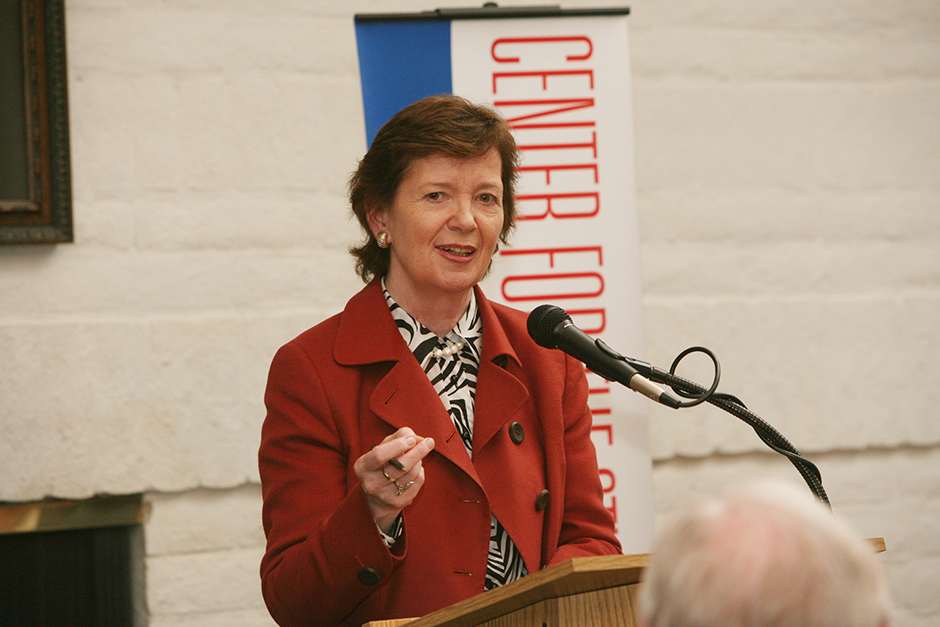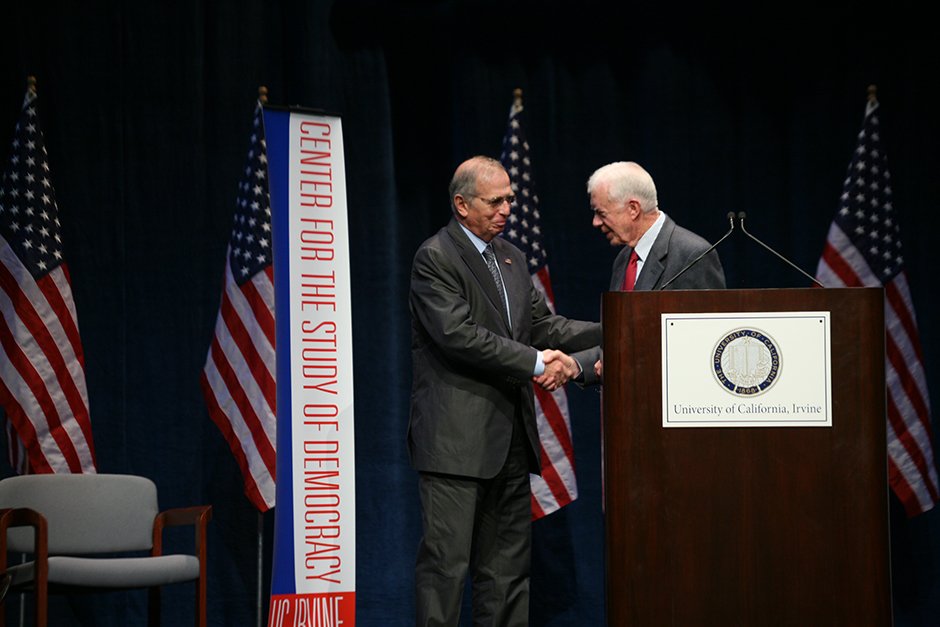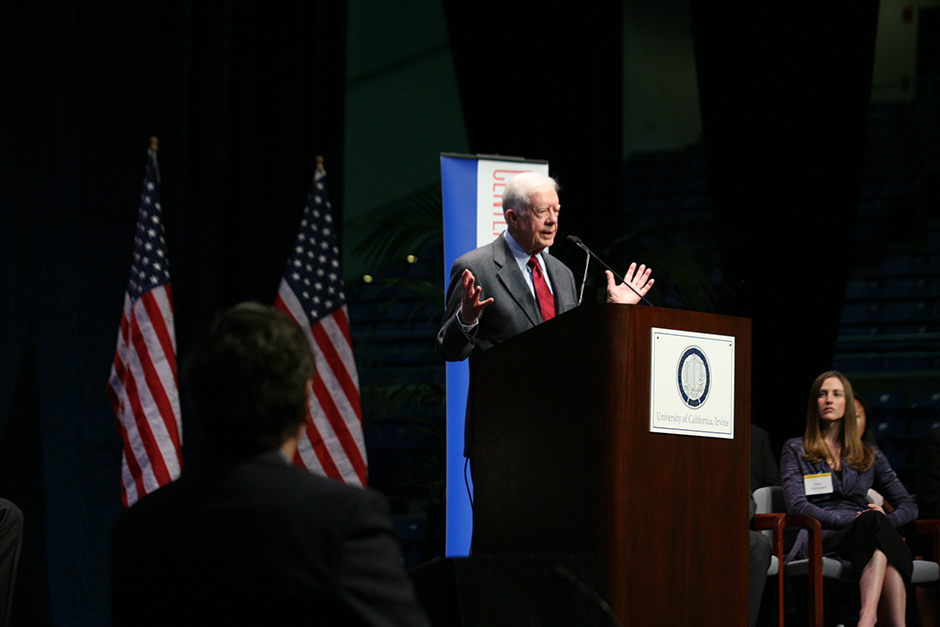Democracy, then and now
The mission of the UCI Jack W. Peltason Center for the Study of Democracy remains
as relevant today as it was 30 years ago

When the program that would become the UCI Jack W. Peltason Center for the Study of Democracy launched in 1991, it did so at a time of tremendous promise. The Berlin Wall had just fallen. The Soviet Union was collapsing. And in countries from Africa to South America, democratization was on the rise.
“There was a global wave taking place and a sense of optimism around helping these aspirational democracies succeed,” says founding director Russell Dalton, UCI political science research professor. “It was really a great time for democracy.”
It’s hard to recall a time when there was such sustained academic or public interest in the future of democracy.
With a plan to support social scientific study on what was happening around the world and why, the center embarked on a more than 30-year journey crafting research and programming that has informed and guided government officials, policymakers, scholars and global citizens on democracy’s challenges and opportunities.
That core mission, says current director Graeme Boushey, political science professor, remains just as relevant today as headlines and dinner table discussions run rife with examples of democracy’s global threats.
“Polarization, populism, political misinformation, ethno-nationalism, voter suppression, gerrymandering, and constitutional malapportionment—these are but a few examples,” he says. “Backsliding across the globe in nations like Hungary, India, Brazil, and the U.S. have brought new urgency to understanding not only how democracies develop and function, but also the contemporary threats to liberal democracy and the continued barriers to democratic inclusion.”
“It’s hard to recall a time when there was such sustained academic or public interest in the future of democracy.”
With a busy schedule of public-facing programs and events, numerous granting opportunities available for faculty and student research, training and collaborations, and a broadened base to include affiliates tackling new topics in democracy’s overlap with law, informatics, public health, the environment, and more, CSD continues to rise to meet the needs of the time.
First of its kind
The center whose legacy has spanned four decades, six U.S. presidents and countless global conflicts, began as a focused research program - the first of its kind on a U.S. college campus. It was the brainchild of a group of renowned political scientists including Harry Eckstein, who wrote a seminal work in the 60s on foundations in democracy; Bernie Grofman, a leading authority on representation, voting rights and redistricting; and Rein Taagepera, an electoral systems specialist who went on to become a politician and presidential candidate in his native Estonia.
“The School of Social Sciences was founded with an interdisciplinary vision, but it is hard to fight against disciplinary pressures that can act to narrow the scope of research,” says Grofman, political science Distinguished Professor and inaugural Jack W. Peltason Endowed Chair. He also served as the center’s third director. “CSD was intended to play a unifying role in the school by bringing together social scientists whose empirical and theoretic concerns are central to understanding the functioning of modern democracies: political scientists, both with respect to American politics and to comparative politics; economists, especially those who study political economy; and sociologists, especially those who study political sociology. While we are always social scientists first and foremost, concerned with making sense of the world, I think it fair to say that we were also committed to strengthening democracy in the U.S. and worldwide.”
With this in mind, they embarked on finding an up-and-coming scholar to lead the effort. Enter Dalton.
“I remember interviewing for a faculty position at UCI in 1990 and listening to this group’s passion for the development of a program that would bring together all of these fields that impact democracy; it got me excited,” Dalton recalls.
We had the brightest minds and the right people in relevant areas of study all working together to take on these big topics. It was serendipitous how everything came together at the right time while we had a group of people who had the energy to exploit it.
During that same interview, Taagepera shared that his Estonian contacts were hearing rumblings that the Soviet Union was crumbling – news that proved prescient when, a year later, it did. And the research program was at the ready with program faculty poised to take on studies of both developing and established democracies.
It would be nearly a decade before the distinctive program was named an Organized
Research Unit – a campus-level designation that came with supportive infrastructure
and formal recognition of the center’s interdisciplinary research agenda – yet CSD
was incredibly active in those early years. Scholars from multiple departments and
schools converged through formal collaborative research, global conferences, and events
to cover the many facets of democracy.
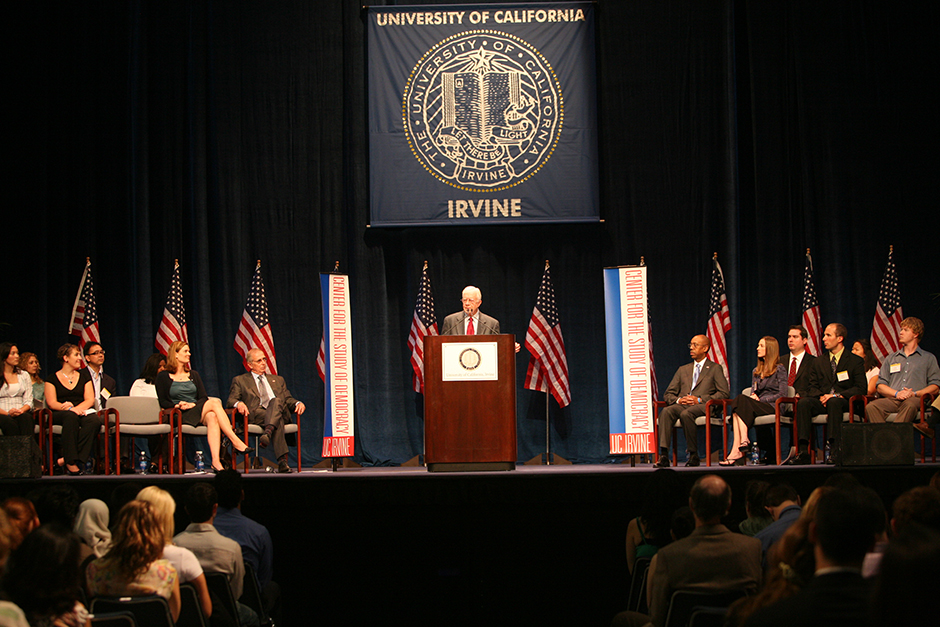
Dalton, Eckstein and Taagepera applied for, received and then steered more than $500K in National Science Foundation support toward a number of program activities including a conference series on post-Soviet Russia. They launched some of the first empirical studies on the rapidly changing course of governments trying to democratize.
“The group benefited from the academic legitimacy of their combined reputations and Dalton's tireless work ethic, and they really did a marvelous job bringing together the right people whose work was both democracy-focused and well regarded,” says William R. Schonfeld, political science professor emeritus who was dean during the program’s infancy. He served as the center’s second director. “The NSF funding laid the groundwork for the center's operations and propelled it forward.”
Dalton agrees: “We had the brightest minds and the right people in relevant areas of study all working together to take on these big topics. It was serendipitous how everything came together at the right time while we had a group of people who had the energy to exploit it.”
Foundational fellows
In addition to faculty-led research projects, another hallmark of the center that benefited early on from the founders’ efforts to secure funding was a focus on training future democracy scholars. The Democracy Fellows program was created in 1994 with NSF support. Two privately endowed fellowships followed suit in 1999 with gifts from William F. Podlich, a nationally respected finance expert, co-founder of Pacific Investment Management Company (PIMCO) in Newport Beach, and founding member of the center’s board, and Jack W. Peltason, a founding UCI and center faculty member, past UCI chancellor and president of the University of California, and author of what's considered one of the all-time leading textbooks on the American government. (Peltason played a pivotal role in the center’s development and program delivery throughout his lifetime; in 2016, the center was renamed in his honor.)
These opportunities gave me insights on what can strengthen newer democracies, and what common challenges new and older democracies face in a rapidly changing world.
Together, the Democracy Fellowship and those bearing the donors’ namesakes have supported more than 140 graduate students who’ve gone on to become national polling experts, esteemed faculty members and federal court clerks while others have enjoyed full careers in the federal government and in private consultancy.
Lina Newton, UCI political science Ph.D. ’02, and Anthony Salvanto, UCI political
science Ph.D. ’00, were among the inaugural class of Democracy Fellows.
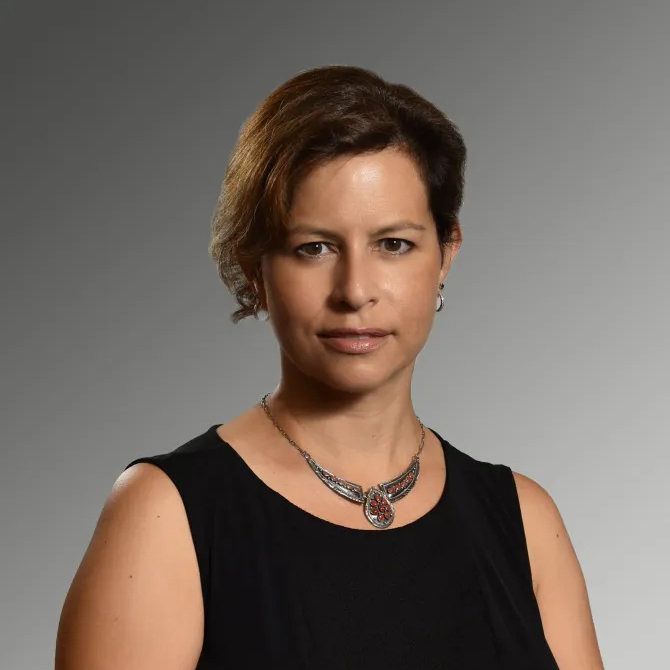
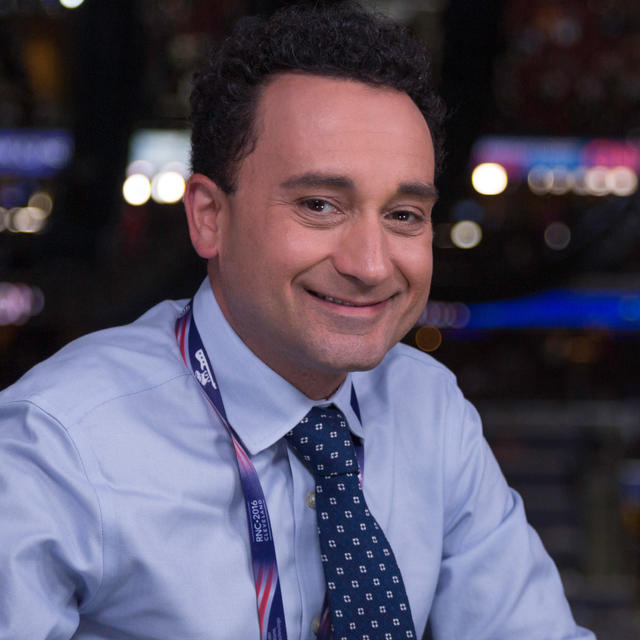
“As graduate students - even in our first year - we were immediately exposed to scholars whose works we’d read: Sidney Verba, whose coauthored book, Voice and Equality, that came out around 1995 had a real impact on my decision to change over to American politics in my second year; Elinor Ostrom, the only woman to win a Nobel Prize in economics; and her intellectual and life partner, political economist Vincent Ostrom,” says Newton.
“These opportunities gave me insights on what can strengthen newer democracies, and what common challenges new and older democracies face in a rapidly changing world.”
Salvanto agrees: “Our training encouraged us to rigorously think about and study different kinds of problems and apply sound approaches to key questions. Importantly, it also prepared us to test our ideas and communicate well.”
The fellowship made an indelible mark on their UCI Ph.D. experience and helped shape the course of their careers as well as their life together as a New York power couple and proud parents of two. Salvanto is currently Executive Director of Elections and Surveys at CBS News, and Newton is a tenured political science associate professor at Hunter College - part of The City University of New York.
“I look back on the program's combination of depth and breadth of training as great preparation. My interests then, as now, include U.S. politics and public opinion, elections, and voting,” Salvanto says. “Over the years, and especially amid the ever-changing landscape of American society and politics, so many of the ideas, concepts and approaches learned in the program are ones I still work with and rely upon all the time.”
“Because CSD was structured broadly around democratization and had affiliated faculty
from different disciplines, I took courses with political sociologists, had opportunities
to likewise meet guest scholars and attend conferences where forces like globalization,
and demographic changes raised new challenges for democratic citizenship, participation,
and domestic policy,” says Newton. “This early experience of CSD and UCI still orients
my career; I am still animated by my concerns about US democracy at a time of tremendous
and rapid social changes, and I remain deeply curious about how our democratic institutions
can respond to both the challenges and opportunities that newcomers bring to the democratic
experiment.”
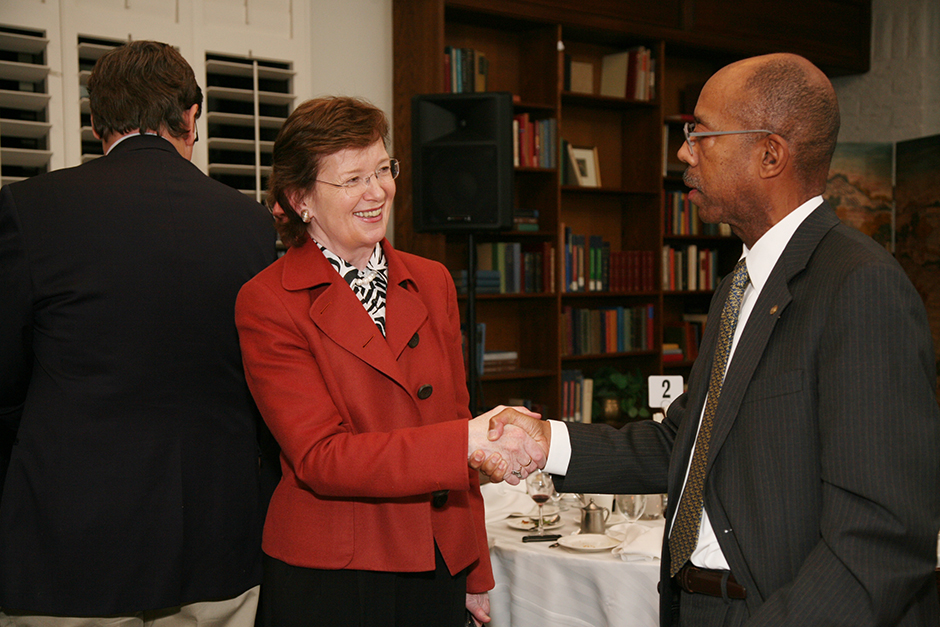
Famous faces
As the program’s success grew, so too, did support and recognition of its efforts across the campus and community.
In 2001, CSD became UCI’s thirteenth Organized Research Unit.
The center made an early investment in connecting the university with the community by committing to bringing in well-known public figures from both sides of the aisle. This substantive focus was critical to its success in establishing new relationships with community and board members.
The center assembled a unique board of directors with members whose different political views and values created opportunities for bipartisan discussion in a neutral university setting. The conversations and connections within this group allowed the center to bring notable names in politics and famous faces from media and global government circles to campus for the annual Peltason Lecture. The series was established in 1999 with a generous grant from the William and Flora Hewlett Foundation—with the support of then-president David Gardner—to honor the contributions of Jack and Suzanne Peltason.
The endowment has provided continuing support for the center to host an annual Peltason Lecturer, the likes of which have included Senators Ted Kennedy (D-Massachusetts) and Alan Simpson (R-Wyoming); Jeane Kirkpatrick, foreign policy advisor to Ronald Reagan and the first American woman to serve as ambassador to the United Nations; Vicente Fox, former president of Mexico; José María Aznar, former Prime Minister of Spain; Mary Robinson, former United Nations High Commissioner for Human Rights and former President of Ireland; Ezra Klein, co-founder and editor of Vox Media; Ed Rollins, campaign manager for presidential candidate Mike Huckabee; and many more including this year’s speaker, Masha Gessen, a Russian-American journalist, author, translator and activist who shared perspective on the war in Ukraine.
“The center made an early investment in connecting the university with the community by committing to bringing in well-known public figures from both sides of the aisle,” says Schonfeld. “This substantive focus was critical to its success in establishing new relationships with community and board members.”
During his term as center director, Schonfeld helped bring to campus former U.S. President
Jimmy Carter for the annual Peltason Lecture. More than 3,000 people filled the Bren
Center to hear the Nobel laureate talk passionately about opportunities for peace
between Israel and Palestine.
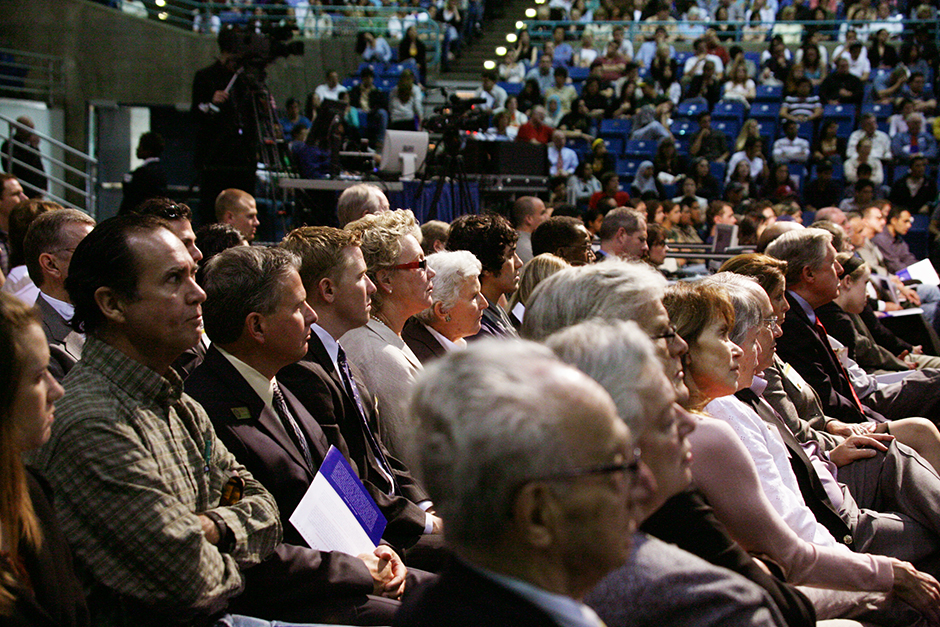
During his term as center director, Schonfeld helped bring to campus former U.S. President Jimmy Carter for the annual Peltason Lecture. More than 3,000 people filled the Bren Center to hear the Nobel laureate talk passionately about opportunities for peace between Israel and Palestine.
“There was such a special energy on campus that day,” Schonfeld says. “It was just extraordinary to be there.”
The center also established lectureships honoring contributions of founding member Harry Eckstein as well as Robin M. Williams Jr., a past president of the American Sociological Association and leading scholar on ethnic conflict, race and inequality, and military sociology who spent two decades at UCI as a visiting professor in the Department of Sociology. And the Economics of Governance Lecture, sponsored by City National Bank, rounds out the center's named series and partnership with economics as it brings to campus distinguished economists and experts on economic policy to discuss challenges facing our state and nation.
“The center uses these lectures to focus attention on the problems democracies are facing throughout the world to expand the level of empirical scholarly research on democracy and democratization within the national and international academic communities,” says Louis DeSipio, Chicano/Latino studies and political science professor who served as the center’s fourth director.
Past lectures have been delivered by senior fellows and academics, legislators, and a notable name currently in the news—Janet Yellen, current U.S. Secretary of the Treasury who was then the CEO and president of the Federal Reserve Bank of San Francisco.
“While the design of the lectures is discipline specific, the goal of each of the
annual lectures is to serve as a bridge both to the larger Southern California community
and to facilitate scholarly discussions on campus,” says DeSipio. “CSD is committed
to helping train the next generation of democracy scholars, including UCI graduate
students and predoctoral and postdoctoral scholars who come as guests of the center
to work with CSD faculty and participate in all center events.”
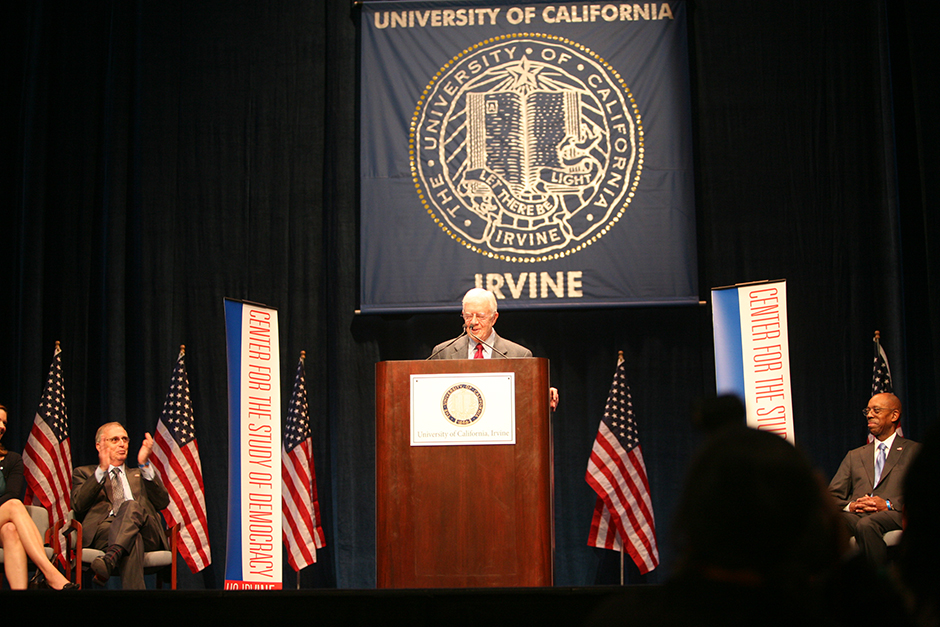
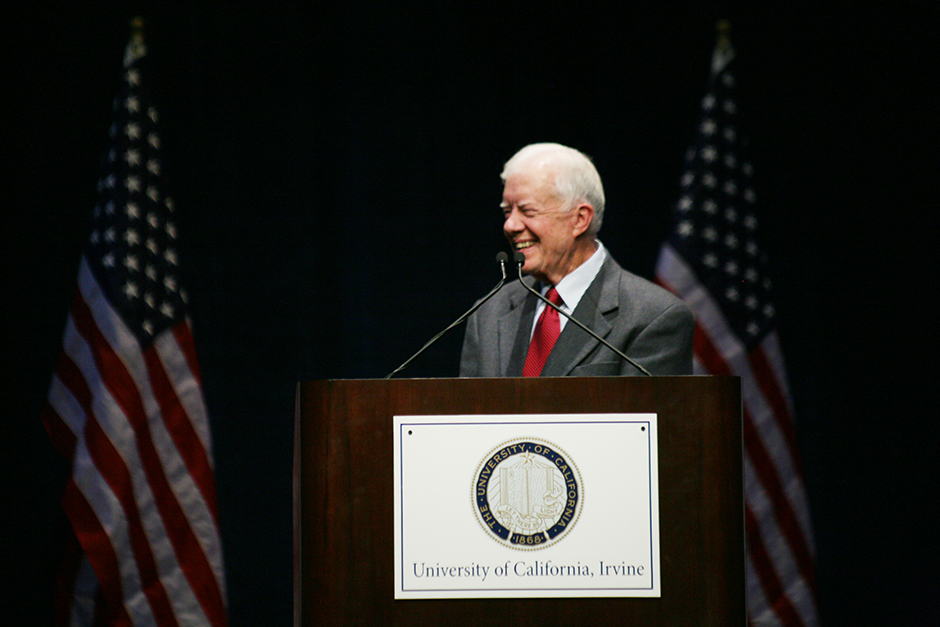
From here forward
When COVID-19 halted in-person activities in 2020, the center continued hosting speakers remotely to address timely topics in democracy, including multiple panels on partisanship and policy preference during the pandemic, election explainers, and a pop-up panel to help campus and community members understand and process the Jan. 6 insurrection at the U.S. Capitol. More than 500 people tuned in to the latter.
Following the inauguration of President Joe Biden, the center hosted a discussion panel with race, voting and electoral scholars to talk about the challenges and opportunities ahead for the 46th U.S. president at a time of heightened political polarization amid a global pandemic that was showing no signs of slowing.
Additional online talks on new and continued threats to democracy helped give attendees a critical space to meet, learn and discuss what was happening while we were all still sort of locked down, says Boushey.
“This renewed urgency in understanding core questions of democracy has presented an opportunity for CSD to evolve while remaining true to its mission,” he says.
The center has continued to expand its community of affiliates to keep pace with the changing landscape of democracy through new and diverse voices and areas of study including experts on misinformation, money and psychology. The innovative group brings strengths in citizenship and democratic inclusion and institutional and structural barriers to democracy.
This renewed urgency in understanding core questions of democracy has presented an opportunity for CSD to evolve while remaining true to its mission.
“These clusters will carry forward CSD’s established tradition of excellence in work on democratic transition, electoral politics, social movements, and racial and ethnic politics, while expanding the substantive research emphases of the center to address interdisciplinary questions relating to information processing, political misinformation, and democratic erosion and exclusion,” he says.
And as in-person activities have fully resumed, Boushey is building on the center’s storied history with big plans for its future. In addition to Gessen, the center has welcomed several domestic and international scholars to campus to talk about partisanship and deliberative democracy at home and abroad.
“The problems facing global democracies are not going away,” says Boushey. “While today's threats may be different from those in the past, the call to scholars to understand them remains the same. And our center’s mission—to coordinate an intellectual community and produce research addressing these challenges—rises in tandem.”
Stay tuned for future programming from the Jack W. Peltason Center for the Study of Democracy at democracy.uci.edu. Join the center’s mailing list to be one of the first to know about up-coming events. To learn more about supporting center activities, scholarship and research, contact UCI social sciences development senior executive director Tracy Arcuri, tarcuri@uci.edu or 949.824.8093 or senior director Liz Codispoti, e.codispoti@uci.edu or 949.824.8079.
- Heather Ashbach, UCI Social Sciences



